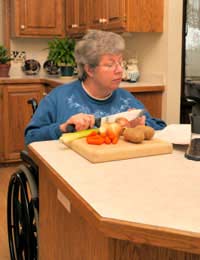Transitions and Young People With Learning Disabilities

For many young people, moving from school life into a new ‘phase’ of young adulthood – be it at 16 or 18 – can be both an exciting and daunting prospect. And for young people with a learning disability, this time of transition can also present new challenges in terms of employment, education, health, friendships and relationships, and social life.
That’s why it’s so crucial that each young person with a learning disability has the right kind of support and planning available to them, to help reduce the stress and anxiety of transitioning, and offer equal opportunities as their new life unfolds and moves forward.
Having a Voice
In their three-year strategy ‘Valuing People Now’, the UK Government has outlined ways in which the lives of people with learning disabilities, as well as their families, can be improved. One aspect of Valuing People Now stipulates that all young people with learning disabilities should be supported with PCP (person-centred planning), which includes specific reviews and plans during their period of transition.The main focus of such reviews is to ensure that each young person with a learning disability is given ample opportunity to have their say about what they want to achieve, and are given the necessary support and advice to help them reach their goals. The reviews also make sure that they are fully and positively aware of what their future possibilities are, as well as setting out a clear action plan to reach their goals, as well as covering other areas of their life such as housing, community care and social life, or further education.
Equal Opportunities in Paid Employment
Transition involves lots of different aspects of moving into adulthood. There are many organisations dedicated to providing resources and support in all areas of transition, including health, finances, housing, transport and travel, and positive activities.As with all young people, employment remains an important subject for people with disabilities. The UK Government says that young people with learning disabilities should have equal life opportunities, and this includes the chance to leave school and move into paid employment, if they are able to do so.
The UK Government Department of Health’s ‘Getting a Life’ programme addresses the various issues surrounding the different transition paths and support required for young people with moderate or severe learning disabilities to obtain paid employment. It also enables professionals to look at ways in which changes to the system could make specific transitions more efficient and effective.
The programme focuses on a number of aims to improve employment outcomes, such as the exploration of ways in which person centred planning will bring together the different employment processes, funding streams and assessments from a variety of local and national policy areas. These include a variety of public resources, such as LSC and Connexions (for post-16), as well as Job Centre Plus, and adult social care assessment and day service funding.
It is envisaged that ‘Getting a Life’ will help to establish and bring together a community of professionals and experts that can devise new approaches, ease the challenges and present alternative pathways to employment for young people with learning disabilities during their ‘transition’.
- How I Detected Signs of Autism in My Child: Case Study
- Incontinence and Learning Disabilities
- Menopause and Women a Learning Disability
- What is Opposition Defiance Disorder?
- Learning Disabilities and Self-Injurious Behaviour
- Art Therapy and Learning Disabilities
- Diagnosing and Assessing Learning Disabilities
- Mental Health Issues
- Non-Verbal Learning Disabilities
- All About Writing Disabilities
- All About Williams Syndrome
- All About Asperger Syndrome
- How to Define and Categorise Learning Disabilities
- Challenging Behaviour
- All About Reading Disabilities
- What Is a Learning Disability?


Re: Vulnerable Adults and Protection from Crime
I am asking for help in regards to my younger brother. He is 42 with learning disabilities, he is extremely…
Re: Vulnerable Adults and Protection from Crime
I am asking for help in regards to my younger brother. He is 42 with learning disabilities, he is extremely…
Re: Vulnerable Adults and Protection from Crime
I am asking for help in regards to my younger brother. He is 42 with learning disabilities, he is extremely…
Re: Vulnerable Adults and Protection from Crime
I am asking for help in regards to my younger brother. He is 42 with learning disabilities, he is extremely…
Re: The Human Rights Act and Learning Disabilities
I have now been waiting for adaptations to my home since 2016, these as assessed adaptations which I have…
Re: Advocacy for Individuals With Learning Disabilities
A 63 year old friend of mine who has learning disabilities, he attended a special school and can…
Re: Non-Verbal Learning Disabilities
I have been struggling with some of the above since secondary school (I'm now early 60s). I was way ahead in verbal and…
Re: Advocacy for Individuals With Learning Disabilities
My partner (F35) has a twin brother who has learning difficulties. They have always had a good…
Re: Advocacy for Individuals With Learning Disabilities
Need support
Re: Disability Discrimination Act 1995 and Employment
i am mother that got looked down on in family courts done placements fpr adoption for my 3 young boys…